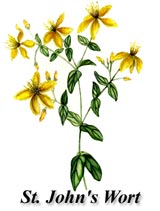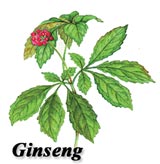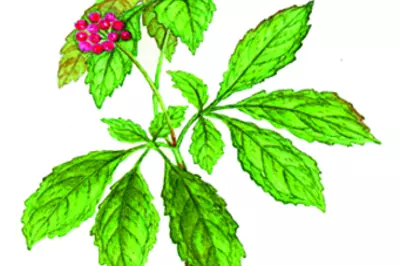
These are the top 10 best-selling botanicals in the U.S. today. Click on a botanical to learn how it is used, possible risks and adverse effects, and references.
According to the market report the top 10 best selling herbs in 2011 were, in rank order:
Cranberry (Vaccinium macrocarpon)
Cranberry juice and concentrated cranberry extracts, which contain a class of antioxidants known as anthocyanins, have recently become widely used for the prevention (and occasionally treatment) of urinary tract infections. Clinical studies have shown that it is effective, but not for all populations (Cimolai & Cimolai, 2007). The effectiveness of cranberry is thought to be related to its antimicrobial properties and possibly because it prevents bacteria from sticking to the urinary tract. In addition to its utility for treating urinary tract infections, cranberry is also used in holistic therapies that focus on the heart. Accumulating evidence indicates that cranberry, as well as other fruits rich in antioxidants, may reduce the risk of cardiovascular disease by increasing the resistance of LDL to oxidation, inhibition of platelet aggregation, reducing blood pressure, and reducing inflammation in circulatory vessels (see McKay and Blumber, 2007).
Possible Adverse Effects
As with other herbs that are known to stop blood from clotting, there is a potential for adverse interactions between cranberry juice or cranberry extracts and anticoagulant (or anti-blood clotting) medications, such as Warfarin. A review of the reported case studies, however, concluded that there was sparse evidence for a clinically relevant interaction between cranberry juice ingestion and anticoagulant medicines (Pham & Pham, 2007).
Contraindications
Because cranberry juice is acidic, it has been suggested that ingestion of large amounts may increase the risk of kidney stone formation. However, a 2005 study (Gettman et al., 2005) concluded that cranberry juice slightly increased some risk factors (by elevating levels of urinary calcium and oxalate), while decreasing other risk factors. The authors concluded that overall, cranberry does not increase the risk of kidney stone formation. Diabetics should use sweetened cranberry juice with caution to ensure that it remains within the range for glucose tolerance. Ingestion of large amounts of cranberry juice (> 3-4 L/day) can cause diarrhea and other gastro-intestinal symptoms.
Saw palmetto (Serenoa repens)
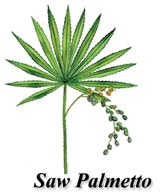 Earlier clinical studies in which saw palmetto was compared to finasteride in the treatment of benign prostatic hyperplasia (BPH) report that the herbal preparations were comparable in efficacy.
Earlier clinical studies in which saw palmetto was compared to finasteride in the treatment of benign prostatic hyperplasia (BPH) report that the herbal preparations were comparable in efficacy.
However, more recent studies have found no differences between saw palmetto and placebo (Tacklind et al, 2009).
Note that saw palmetto is not effective for the prevention or treatment of prostate cancer.
Possible Adverse Effects
Saw palmetto is very well-tolerated with rare side-effects.
Contraindications
There are no significant contraindications or recognized drug/botanical interactions.
Soy isoflavones
Many plants contain chemicals called phytoestrogens that have effects similar to human estrogen. One example of phytoestrogens are the isoflavones found in soy, red clover, and flaxseed.
Americans take isoflavones most commonly to treat menopausal symptoms. Although some studies question the effectiveness of isoflavones, one 2006 study noted that soy protein appears to reduce total cholesterol levels, and red clover reduces triglycerides while increasing HDL cholesterol. Overall, the study concluded that isoflavones in soy and red clover appear to have a "small but positive" effect and would be beneficial for menopausal women.
Possible Adverse Effects
Rarely, high quantities of soy or isolated isoflavones cause bowel irritation.
Contraindications
People with allergies to soy or flax should use caution.
There is some uncertainty about the safety of high doses in patients with breast cancer.
Children should not be given dietary supplements that contain high levels of phytoestrogens because they may affect brain development.
Garlic (Allium sativum)
Standardized garlic extract is most often used in the U.S. for its putative ability to lower cholesterol and serum triglycerides. However, recent studies indicate that while it does lower serum triglycerides, it does not lower LDL cholesterol. There is some evidence that it may be useful for many other purposes, including stabilizing blood pressure, enhancing immune functions, protecting against infections, and supporting cardiovascular functions.
Two recent analyses of clinical studies indicate that garlic extract may be effective for the prevention of stomach and colorectal cancers and is moderately effective in lowering serum cholesterol and triglycerides.
Possible Adverse Effects
Garlic can cause smelly breath and body odor. Other possible effects are heartburn, flatulence, nausea, and diarrhea.
Contraindications
There has been some concern about garlic and other herbal supplements hindering the ability of blood to clot and interacting adversely with commonly prescribed anticoagulant (or anti-blood clotting) medicines. However, a recent review and in vivo study (Beckart et al., 2007) found no effect on blood clotting for garlic and four other common herbal supplements in a two-week dosing study, compared with aspirin which markedly inhibited clotting. While the potential for interactions must remain recognized, the initial concerns are overstated, and the emphasis must remain on "potential."
There were several reports that garlic extracts may decrease the effectiveness of the anti-retroviral medication Saquinavir, but subsequent studies have not supported these findings.
Ginkgo
Ginkgo has been well-investigated clinically, particularly for its efficacy in improving memory and cognitive functions in elderly people suffering from impaired cerebral circuation. Some studies state that its benefits are inconsistent or unconvincing (Birks et al. 2007; Carlson et al 2007). However, numerous other clinical studies have reported positive outcomes of Ginkgo biloba treatment for the prevention of cognitive deficits in the elderly (Ramassmay et al. 2007).
Part of the difficulty of evaluating these differing outcomes is related to the methods used in each study, such as the selection of the patient populations, length of treatment, dose of medication, and variability in the composition of the treatment medication. See Dekosky et al. (2006) and Weinmann et al. (2010) for discussions.
Possible Adverse Effects
Reports of adverse reactions have been extremely rare. (It may rarely cause GI upset.)
Contraindications
Can enhance bleeding risk in patients taking anticoagulants or antiplatelet drugs.
Echinacea (Echinacea purpurea; E. angustifolia; E. pallida)
Echinacea, originally a Native American remedy, has gained popularity for treating the symptoms of colds, flu, and respiratory infections. Some research indicates that echinacea has the potential to boost immune cell response, but only certain preparations of echinacea are able to do so, such as fresh pressed juice or isolated polysaccharides (Linde et al., 2006). A meta-analysis of 14 clinical studies on the effects of echinacea on the duration and severity of the common cold (Shah et al., 2007) indicated that pre-treatment with echinacea reduced the odds of developing a cold by 58 percent and reduced the average duration of the infection by 1.4 days. These and other results support the use of echinacea for prevention and treatment of the common cold.
Additional studies are taking place to explore the use of echinacea as a cancer treatment or preventive medicine. Results of a 2005 study (Miller, 2005) with mice found that daily consumption of echinacea was preventive; it extended the life span of aging mice, significantly lessened the effects of leukemia, and it extended the life span of the mice with leukemia. While the results of this mouse study are promising, it is important to keep in mind that animal studies cannot always be assumed to demonstrate clinical efficacy in humans.
Possible Adverse Effects
Echinacea is very well-tolerated.
Contraindications
People with allergies to ragweed may be allergic to echinacea. There are no reported drug/botanical interactions.
Milk Thistle
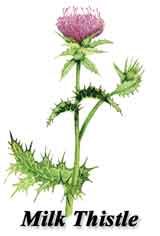 Milk thistle is most commonly used to support the liver and as a liver protectant. It contains powerful antioxidants known as flavonolignans.
Milk thistle is most commonly used to support the liver and as a liver protectant. It contains powerful antioxidants known as flavonolignans.
The potential benefit of milk thistle in the treatment of liver diseases remains a controversial issue, with two recent review studies (Rambaldi, 2007 and Saller, 2008) coming to different conclusions. (The authors of both studies acknowledge that evidence for clinical benefits of milk thistle extracts exist, but comment on the low quality of the clinical evaluations and suggest more rigorous studies are needed to resolve these controversies.)
Adverse effects
No severe adverse effects reported, although some people may experience loose stools.
Contradications
Concerns have been expressed about possible interference with the metabolism of the prescription drug Indinivir, but clinical studies have found no evidence for such interference.
Black Cohosh (Acteae racemosa; formerly: Cimicifuga racemosa)
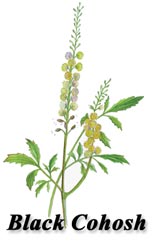 Black cohosh is commonly used to treat menopausal symptoms, especially hot flashes. Some recent studies indicate that combining Black cohosh with St. John's wort could be more effective than Black cohosh alone in treating menopausal symptoms.
Black cohosh is commonly used to treat menopausal symptoms, especially hot flashes. Some recent studies indicate that combining Black cohosh with St. John's wort could be more effective than Black cohosh alone in treating menopausal symptoms.
Possible Adverse Effects
Black cohosh may cause mild GI upset. There are some reports of other side effects with doses higher than 160 mg/day, including nausea, vertigo, uterine contractions, and bradycardia.
Contraindications
There are no known drug/botanical interactions.
St John's Wort
Americans commonly take St. John's wort (Hypericum perforatum) to combat symptoms of depression.
Standardized extracts of St. John's wort have been tested clinically and shown to be an effective alternative to SSRIs or tricyclic antidepressants for the treatment of mild to moderate depression. A recent Cochrane review also suggests that the herb is as effective as standard antidepressants for major depression.
Recent studies (Barnes et al., 2006; Lawvers et al., 2006) found that St. John's wort may be effective in maintaining smoking cessation. More studies need to be done in this area. If St. John's wort proves to be effective in additional large studies, it could be considered a less expensive, and easily accessible, tool for those who wish to quit smoking.
Possible Adverse Effects
Rare effects include nausea, rash, photosensitivity, sexual dysfunction.
Contraindications
There is considerable concern regarding possible interactions of this herb with prescription
medicines, and patients on any medication should consult their physicians prior to using it. Otherwise, it is generally considered safe.
Ginseng (Panax ginseng; Panax quinquifolius)
Chinese or Korean ginseng is most commonly used to increase energy and improve physical and mental performance, enhance immune response, and treat erectile dysfunction.
Because of the multifunctionality of ginseng, there are no clinical studies that comprehensively address all aspects of its actions. Two recent Cochrane reviews each focus on a different effect. A 2008 review found evidence for the effectiveness of red gingseng in the treatment of erectile dysfunction, but cited the need for further studies. A 2010 review looked at the cognitive enhancing effect of ginseng and found a lack of convincing evidence for either healthy participants or patients with dementia. Most other clinical studies have examined other functions.
Possible Adverse Effects
In general, ginseng is well-tolerated, with adverse reactions largely being mild and reversible (Thompson et al., 2002). Reports of severe adverse reactions to ginseng are rare, and many have been associated with the ingestion of excessive doses, which can cause sleeplessness and high blood pressure. One citation that shows up occasionally has been largely discredited and many of the findings retracted by the authors due to poor study design (Siegel, 1979).
Contraindications
Ginseng should not be used by individuals who have acute infections, especially those involving fever, or high blood pressure. Additionally, ginseng should not be used when using large amounts of caffeine or other stimulants. Patients who are preparing for or have undergone organ transplantation should also avoid ginseng.
Cranberry
Cimolai, N., Cimolai, T. (2007). The cranberry and the urinary tract. European Journal of Clinical Microbiology & Infectious Disease, 26(11), 767-776.
Gettman, M., Ogan, K., Brinkley, L., et al. (2005). Effect of cranberry juice consumption on urinary stone risk factors. Journal of Urology, 174, 590-594.
McKay, D.L., Blumberg, J.B. (2007). Cranberries and cardiovascular disease risk factors. Nutrition Review, 65(11), 490-502.
Pham, D.Q., Pham, A.Q. (2007). Interaction potential between cranberry juice and warfarin. American Journal of Health-System Pharmacy, 64(5), 490-494.
Saw palmetto
Avins, A. L., & Bent, S. (2006). Saw palmetto and lower urinary tract symptoms: What is the latest evidence? Current Urology Rep., 7(4), 260.
Bent, S. et al. (2006). Saw palmetto for benign prostatic hyperplasia. New England Journal of Medicine, 354(6), 557-566.
Boyle, P., Robertson, C., Lowe, F., Roehrborn, C. (2004). Updated meta-analysis of clinical trials of Serenoa repens extract in the treatment of symptomatic benign prostatic hyperplasia. British Journal of Urology International, 93(6), 751-756.
Buck, A.C. (2004). Is there a scientific basis for the therapeutic effects of Serenoa repens inbenign prostatic hyperplasia? Mechanisms of action. Journal of Urology, 172(5 Pt 1), 1792-1799.
Fong, Y.K., Milani, S., Djavan, B. (2005). Role of phytotherapy in men with lower urinary tract symptoms. Current Opinion in Urology, 15(1), 45-48.
Tacklind, J., MacDonald, R., Rutks, I., Wilt, T.J. (2009).Serenoa repends for benign prostatic hyperplasia. Cochrane Database Syst Rev. (20): CD001423.
Ulbricht, C., Basch, E., Bent, S., et al. (2006). Evidence-based systematic review of saw palmetto by the Natural Standard Research Collaboration. Journal of the Society for Integrative Oncology, 4(4), 170-186.
Soy isoflavones
Cassidy, A., Albertazzi, P., Nielsen, I.L., et al. (2006). Critical review of health effects of soybean phytooestrogens in post-menopausal women. Proceedings of the Nutrition Society, 65, 76-79.
Krebs, E.E., Ensrud, K.E., MacDonald, R., Wilt, T.J. (2004). Phytoestrogens for treatment of menopausal symptoms: A systematic review. Journal of Obstetrics and Gynecology, 104(4), 824-36.
Kurzer, M.S. (2003). Phytoestrogen supplement use by women. Journal of Nutrition, 133(6), 1983S-1986S.
Tempfer, C.B., Bentz, E.K., Leodolter, S., Tscherne, G., Reuss, F., Cross, H.S., Huber, J.C. (2007). Phytoestrogens in clinical practice: A review of the literature. Fertility and Sterility, 87(6), 1243-1249.
Wietrzyk, J., Grynkiewicz, G., Opolski, A. (2005). Phytoestrogens in cancer prevention and therapy-mechanisms of their biological activity. Anticancer Res., 25(3c), 2357-2366.
Garlic
Borek, C. (2002). Garlic supplements and saquinavir. Clinical Infectious Diseases, 35(3), 343.
Fleischauer, A.T., Poole, C., Arab, L. (2000). Garlic consumption and cancer prevention: Meta-analyses of colorectal and stomach cancers. American Journal of Clinical Nutrition, 72(4), 1047-1052.
Gardiner, C., Lawson, L., Block, E., et al. (2007). Effect of raw garlic vs. commercial garlic supplements on plasma lipid concentrations in adults with moderate hypercholesterolemia. Arch Intern Med, 167, 346-353.
Markowitz, J.S., Devane, C.L., Chavin, K.D., Taylor, R.M., Ruan, Y., Donovan, J.L. (2003). Effects of garlic supplementation on cytochrome P450 2D6 and 3A4 activity in healthy volunteers. Clinical Pharmacology & Therapeutics, 74(2), 170-177.
Reinhart, K.M., Talati, R., White, C.M., Coleman, C.I. (2009). The impact of garlic on lipid parameters: a systematic review and meta-analysis. Nutrition Research Reviews, 22, 39-48.
Thomson M, Ali M. (2003). Garlic: A review of its potential use as an anti-cancer agent. Curr Cancer Drug Targets, 3(1), 67-81.
Williams, M., Sutherland, W., McCormick, M., Yeoman, D., de Jong, S. (2005). Aged garlic extract improves endothelial function in men with coronary artery disease. Phytother Res, 19, 314-319.
Ginkgo
Birks, J., Grimley, Evans J. (2007). Ginkgo biloba for cognitive impairment and dementia. Cochrane Database of Systematic Reviews, 18(2), CD003120.
Carlson, J.J., Farquhar, J.W., DiNucci, E., Ausserer, L., Zehnder, J., Miller, D., Berra, K., Hagerty, L., Haskell, W.L. (2007). Safety and efficacy of a Ginkgo biloba-containing dietary supplement on cognitive function, quality of life, and platelet function in healthy, cognitively intact older adults. Journal of the American Diet. Assn., 107(3), 432.
DeKosky, S., Fitzpatrick, A., Ives, D, et al. (2006). The Ginkgo Evaluation of Memory study: Design and baseline data of a randomized trial of Ginkgo biloba extract in prevention of dementia. Contemporary Clinical Trials, 27, 238-253.
Gaus, W., Westendorf, J., Diebow, R., Kieser, M. (2005). Identification of adverse drug reactions by evaluation of a prescription database, demonstrated for "risk of bleeding." Methods of Information in Medicine, 44, 697-703.
Gertz, H.J., Kiefer, M. (2004). Review about Ginkgo biloba special extract EGb 761 (Ginkgo). Current Pharmaceutical Design, 10(3), 261-264.
Napryeyenko, O., Borzenko, I., GINDEM-NP Study Group (2007). Ginkgo biloba special extract in dementia with neuropsychiatric features. A randomised, placebo-controlled, double-blind clinical trial. Arzneimittelforschung, 57(1), 4-11.
Ramassamy, C., Longpré, F., Christen, Y. (2007). Ginkgo biloba extract (EGb 761).in Alzheimer's disease: Is there any evidence? Current Alzheimer Res., 4(3), 253-62.
Snitz, B.E., O'Meara, E.S., Carlson, M.C., et al. (2009). Ginkgo biloba for preventing cognitive decline in older adults: a randomized trial. Journal of the American Medical Association, 302(24), 2663-2670.
Wang, B.S., Wang, H., Song, Y.Y., et al. (2010). Effectiveness of standardized Ginkgo biloba extract on cognitive symptoms of dementia with a six-month treatment: a bivariate random effect meta-analysis. Pharmacopsychiatry, 43(3), 86-91.
Weinmann, S., Roll, S., Schwarzbach, C., Vauth, C., Willich, S.N. (2010). Effects of Ginkgo biloba in dementia: systematic review and meta-analysis. BMC Geriatrics, 10, 14.
Echinacea
Barrett, B. (2003). Medicinal properties of echinacea: A critical review. Phytomedicine, 10(1), 66-86.
Carr, M.M. Nahata, M. (2006). Complementary and alternative medicine for upper-respiratory-tract infection in children. American Journal of Health-System Pharmacy, 63(1), 33-39.
Islam, J., Carter, R. (2005). Use of echinacea in upper respiratory tract infection. Southern Medical Journal, 98(3), 311-318.
Linde, K. et al. (2006). Echinacea for preventing and treating the common cold. Cochrane Database of Systematic Reviews, 25(1), CD000530.
Miller, S. C. (2005). Echinacea: A miracle herb against aging and cancer? Evidence in vivo in mice. Evidence Based Complementary Alternative Medicine, 2(3), 309.
Shah, S.A., Sander, S., White, C.M., Rinaldi, M., Coleman, C.I. (2007). Evaluation of echinacea for the prevention and treatment of the common cold: A meta-analysis. Lancet Infectious Disease, 7(7), 473-80.
Milk thistle
Abenavoli, L., Capasso, R., Milic, N., Capasso, F. (2010). Milk thistle in liver diseases:past, present, future. Phytotherapy Research, 24(10), 1423-1432.
El-Kamary, S.S., Shardell, M.D., Abdel-Hamid, M., et al. (2009). A randomizedcontrolled trial to assess the safety and efficacy of silymarin on symptoms, signs andbiomarkers of acute hepatitis. Phytomedicine, 16(5), 391-400.
Mills, E., Wilson, K., Clarke, M., et al. (2005). Milk thistle and indinavir: A randomized controlled pharmacokinetics study and meta-analysis. European Journal of Clinical Pharmacology, 61, 1-7.
Rambaldi, A., Jacobs, B.P., Gluud, C. (2007). Milk thistle for alcoholic and/or hepatitis B or C virus liver diseases. Cochrane Database Syst Rev.: CD003620.
Saller, R., Meier, R., Brignoli, R. (2001). The use of silymarin in the treatment of liver disease. Drugs, 61(14), 2035-2063.
Tamayo, C., Diamond, S. (2007). Review of clinical trials evaluating safety and efficacy of milk thistle. Integrative Cancer Therapies, 6(2), 146-157.
Black cohosh
Briese, V., Stammwitz, U., Friede, M., Henneicke-von, Zepelin, H.H. (2007). Black cohosh with or without St. John's wort for symptom-specific climacteric treatment-results of a large-scale, controlled, observational study. Maturitas, 57(4), 405.
Chung, D.J., Kim, H.Y., et al. (2007). Black cohosh and St. John's wort for climacteric symptoms. Yonsei Medical Journal, 48(2), 289.
Geller, S.E., Studee, L. (2005). Botanical and dietary supplements for menopausal symptoms: What works, what does not. Journal of Women's Health, 14(7), 634-649.
Haimov-Kochman R, Hochner-Celnikier D. (2005). Hot flashes revisited: pharmacological and herbal options for hot flashes management. What does the evidence tell us? Acta Obstet Gynecol Scand., 84(10), 972-979.
Lieberman, S. (1998). A review of the effectiveness of Cimicifuga racemosa (black cohosh) for the symptoms of menopause. Journal of Women's Health, 7(5), 525-529.
Mahady, G.B., Fabricant, D., Chadwick, L.R., Dietz, B. (2002). Black cohosh: An alternative therapy for menopause? Nutrition in Clinical Care, 5(6), 283-9.
Taylor, M. (2003). Alternatives to HRT: An evidence-based review. International Journal of Fertility & Women's Medicine, 48(2), 64-8.
St. John's wort
Barnes, J., Barber, N., Wheatley, D., Williamson, E.M. (2006). A pilot randomised, open, uncontrolled, clinical study of two dosages of St John's wort (Hypericum perforatum) herb extract (LI-160) as an aid to motivational/behavioural support in smoking cessation. Planta Medica, 72(4), 378-82.
Clement, K., Covertson, C.R., Johnson, M.J., Dearing, K. (2006). St. John's wort and the treatment of mild to moderate depression: A systematic review. Holistic Nursing Practice, 20(4), 197-203.
Kasper, S., Caraci, F., Forti, B., Drago, F., Aguglia, E. (2010). Efficacy and tolerability of Hypericum extract for the treatment of mild to moderate depression. European Neuropsychopharmacology, 20(11), 747-765.
Lawyere, S., Mahoney, M.C., Cummings, K.M., Kepner, J.L, et al. (2006). A Phase II study of St. John's wort for smoking cessation. Complementary Therapy Medicine, 14(3), 175.
Linde, K., Berner, M.M., Kriston, L. (2008). St John's wort for major depression. Cochrane Database of Systematic Reviews, (4), CD000448.
Madabushi, R., Frank, B., Drewelow, B., Derendorf, H., Butterweck, V. (2006). Hyperforin in St. John's wort drug interactions. European Journal of Clinical Pharmacology, 63(2), 225.
Schulz, V. (2006). Safety of St. John's wort extract compared to synthetic antidepressants. Phytomedicine, 13(3), 199-204
Pilkington, K., Boshnakova, A., Richardson, J. (2006). St John's wort for depression: Time for a different perspective? Complementary Therapies in Medicine, 14(4), 268-81.
Ranlov, C., Mehlsen, J., Thomsen, C.F., Hedman, C., von Fircks, H., Winther, K. (2006). The efficacy of St. John's wort in patients with minor depressive symptoms or dysthymia-a double-blind placebo-controlled study. Phytomedicine, 13(4), 215.
Ginseng
Cheng, Y., Shen, L.H., Zhang, J.T. (2005). Anti-amnestic and anti-aging effects of ginsenoside Rg1 and Rb1 and its mechanism of action. Acta Pharmacologica Sinica, 26(2), 143-149.
Geng, J., Dong, J., Ni, H., et al. (2010). Ginseng for cognition. Cochrane Database of Systematic Reviews, (12), CD007769.
Jang, D.J., Lee, M.S., Shin, B.C., Lee, Y.C., Ernst, E. (2008). Red ginseng for treating erectile dysfunction: a systematic review. British Journal of Clinical Pharmacology, 66(4), 444-450.
Kim, S.H., Park, K.S., Chang, M.J., Sung, J.H. (2005). Effects of Panax ginseng extract on exercise-induced oxidative stress. Journal of Sports Medicine and Physical Fitness, 45(2), 178-182.
Leung, K.W., Yung, K.K., Mak, N.K., et al. (2007). Angiomodulatory and neurological effects of ginsenosides. Current Medical Chemistry, 14(12), 1371-80.
Radad, K., Gille, G., Liu, L., Rausch, W.D. (2006). Use of ginseng in medicine with emphasis on neurodegenerative disorders. Journal of Pharmacological Sciences, 100(3), 175-86.
Reay, J.L., Kennedy, D., Scholey, A. (2006). Effects of Panax ginseng, consumed with and without glucose, on blood glucose levels and cognitive performance during sustained 'mentally demanding' tasks. Journal of Psychopharmacology, 0(6),771-781.
Siegel, R.K. (1979). Ginseng abuse syndrome. Problems with the panacea. Journal of the American Medical Association, 241(15), 1614-1615.
Thompson, Coon J., Ernst, E. (2002). Panax ginseng: A systematic review of adverse effects and drug interactions. Drug Safety, 25(5), 323-344.
